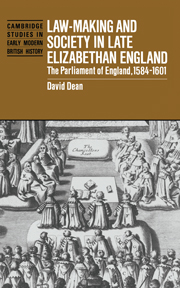Book contents
- Frontmatter
- Contents
- Acknowledgements
- Note to the reader
- List of abbreviations
- Introduction
- 1 Initiation and procedure
- 2 Supply and the general pardon
- 3 The crown and the state
- 4 Religion and the church
- 5 The commonweal
- 6 Law reform
- 7 Private legislation
- 8 Expiring laws continuance acts
- Epilogue: the Parliament of 1604
- Conclusion
- Index of acts
- Index of bills
- General index
4 - Religion and the church
Published online by Cambridge University Press: 14 September 2009
- Frontmatter
- Contents
- Acknowledgements
- Note to the reader
- List of abbreviations
- Introduction
- 1 Initiation and procedure
- 2 Supply and the general pardon
- 3 The crown and the state
- 4 Religion and the church
- 5 The commonweal
- 6 Law reform
- 7 Private legislation
- 8 Expiring laws continuance acts
- Epilogue: the Parliament of 1604
- Conclusion
- Index of acts
- Index of bills
- General index
Summary
THE REFORMATION
It now seems clear that 1571 saw the first open division between the Elizabethan protestants in parliament. William Strickland found himself sequestered for introducing a radical reform bill which men like Knollys thought against all reason and wisdom; it offended the Queen and finished off the reform bills so carefully planned by councillors, bishops and others. From that parliament on MPs were regularly urged to resist initiating matters concerning religion. In 1572, after the failure of the bill to reform the rites and ceremonies of the church, the radicals published the Admonition and the View of Popish Abuses, attacking the established church and the bishops. The subsequent pamphlet war with Whitgift lasted throughout the 1570s and 1580s. The Admonition controversy ended any possibility of consensus in parliament over ecclesiastical reform.
As we have seen in the previous chapter, it was the changing international scene which gave the 1584–5 parliament a sense of national emergency and urgency about its work. For some MPs such developments also served to crystallise the dangers of the slow, ‘decaffeinated reformation’ preferred by Elizabeth. She, in turn, by prohibiting the Commons from meddling in matters such as church reform, and promoting Whitgift to Canterbury in 1583, forced the radicals to adopt a more direct and dramatic campaign.
The Privy Council was certainly aware that Whitgift, by forcing ministers to subscribe to his articles, had caused much anger in many counties. Petitions had come into the Council, especially to Burghley and Mildmay, and the forthcoming parliament led to renewed activity.
- Type
- Chapter
- Information
- Law-Making and Society in Late Elizabethan EnglandThe Parliament of England, 1584–1601, pp. 98 - 132Publisher: Cambridge University PressPrint publication year: 1996

